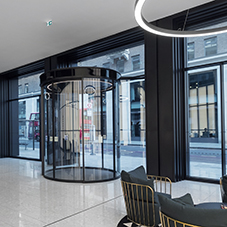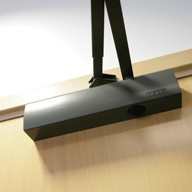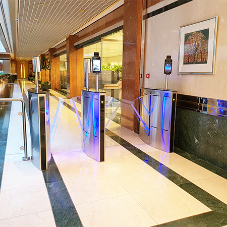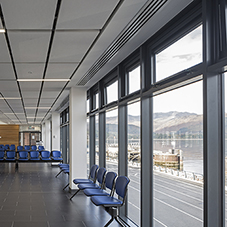A blog written by GEZE UK
“Hands, space, face” is the government slogan we are all familiar with as the fight against the COVID-19 virus continues, but does it go far enough?
The BBC had an interesting news item recently in which a GP questioned whether there should be a fourth added “replace” to encourage the opening of windows to ventilate rooms. Dr Eilir Hughes, who runs a GP surgery in north Wales says replacing stale air in a room with fresh air can massively reduce the chances of people becoming infected: https://www.bbc.co.uk/news/health-55435914
This is relatively easy to do when at home, but can be considerably harder in a work or office environment.
Andy Iredale, GEZE UK’s National Sales Manager, looks at three approaches for ventilation at work:
“Increase Flow of Fresh Air” - Opening routes to intelligent window ventilation
Buildings are becoming increasingly tightly sealed for energy-saving purposes. This saves on heating costs, but often still requires intelligent ventilation to efficiently ventilate and aerate buildings. Natural ventilation provided by automated windows is a smart solution that significantly improves the indoor climate but uses little energy and requires low investment costs.
In busy office environments, with deadlines looming and concentration needed on the topics at hand, opening the window could often be an afterthought. Having systems in place which will essentially “do the thinking” without occupiers having to actively open the window could make a dramatic difference to a recognisable improvement of air flow in and out of spaces.
“Minimise Recirculation of Air” - Give and take needed for an effective flow
Due to modern, energy saving construction methods, we work, live and learn in increasingly tightly sealed buildings. The down side: not enough fresh air flows in and not enough stale air is extracted. Mechanical ventilation is often but this does not always solve the issue. Being unable to control the movement of air, other than through a central building management system then make users uncomfortable in rooms where the windows are always closed.
The alternative to this is controlled, natural ventilation via windows, which automatically draws fresh air directly from outside to prevent “stale” air simply reflowing into the space. Security is often one of the major arguments against opening windows on ground floors along with safety concerns on upper floors.
Giving consideration to having smaller casement windows with simple small bottom hung openers, is a simple and effective approach without comprising on security or safety, allowing windows to be easily opened and closed to also prevent noise pollution at busier periods outside. These can be set automatically for set periods.
“Avoid Stuffy Areas” - Sensing the issue before it happens
Social distancing has challenged the layout of offices dramatically; open plan lay outs are being reconsidered and small office meetings rooms are being avoided. Clever use of office partitioning can also contribute to this separation of air and space if opening windows are readily available in each “section”. Simple movable partitions could also add privacy and other aesthetics whilst also providing some additional separation of ventilated spaces.
Temperature and humidity both play key roles in avoiding stuffy spaces, but acoustic and visual aspects also contribute to wellbeing. As human beings, we tend to take our cues from thermal, acoustic and visual stimuli, but lack a wider sensitivity to air quality. Occupants primarily judge air quality based on smell and “feeling a little warm”, however the longer they spend in the same rooms, the less they notice a reduction in air quality.
We often only notice poor quality air when it is too late. Efficiency drops, people become sleepy or get headaches, and more worryingly in these current circumstances, breathe in stale air which has been recirculated. Again, as mentioned above, fairly simple “on the wall” sensors can sense these hikes in levels and ventilate the space accordingly and as needed.
When combined with other sensor technology such as rain sensors and other weather monitoring devices, roof vents are also a very effective form of day, and indeed night cooling. Offices ventilated at night with the correct security and weather sensors can ensure a cool, fresh office space for occupants to enter at any time of day, to suit more flexible working hours and our rather changing global weather.
If you are a building manager in need of support, contact GEZE UK to see if they can help make the small modifications needed to your building or to conduct a carefully managed walk-round to assess requirements.
For more information on GEZE products visit www.geze.co.uk or email info.uk@geze.com
Is a Breath of Fresh Air in a Building the Fourth Weapon? [Blog]
| T | (01543) 443000 |
|---|---|
| F | (01543) 443001 |
| E | info.uk@geze.com |
| W | Visit GEZE UK Ltd's website |
| Blenheim Way, Fradley Park, Lichfield, Staffs, WS13 8SY |
Products by this Company






